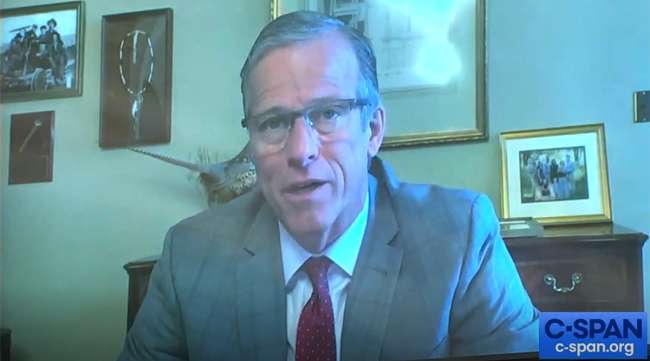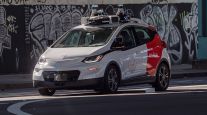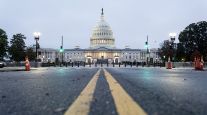Senior Reporter
Sen. Thune Again Highlights AV Bill’s Safety Benefits

[Stay on top of transportation news: Get TTNews in your inbox.]
The nationwide adoption of autonomous vehicle technology would potentially improve safety and connectivity for the commuter and commercial transportation sectors, a key proponent of the technology in the U.S. Senate said at a hearing on March 23.
Sen. John Thune (R-S.D.), a senior member of the Commerce Committee on freight policy, said congressional directives meant to establish a national framework on autonomous vehicles would pave the way for improvements in freight connectivity and boost the overall safety of motorists across mobility networks.
The committee met for a hearing with stakeholders to examine supply chain woes and the shortage of semiconductor chips used in cars and trucks. Legislation Thune has sponsored with Sen. Gary Peters (D-Mich.) on AV technology has yet to gain the requisite support for passage in the chamber.
SUPPORT FOR CHIPS ACT: Stakeholders call for passage
WATCH THE HEARING: Via c-span.org
“The transformation to automated vehicles, or AVs, is going to place a much greater demand on semiconductors and other crucial products. So it’s crucial that the United States remain globally competitive in this space. AVs will radically transform the way Americans move,” Thune said. “This is especially true for the elderly and persons with disabilities, whose current transportation options are limited, especially in rural areas. Moreover, it has potential to greatly reduce the average of more than 40,000 traffic fatalities on the nation’s roadways each year.”
Thune acknowledged the private sector is a leader in the testing and development of AV features. Prominent stakeholders across the commercial transportation sector have called on federal policymakers to craft the regulatory landscape essential for the technology’s national deployment. At the hearing, the senator turned to Paccar Inc. CEO Preston Feight for his perspective on AVs.

Feight testifies remotely from Europe during the committee hearing. (c-span.org)
“Right now the industry is in a really good spot in developing Level 4 autonomy and we’re moving it forward. It needs to be done safely. That’s the most important thing. Safety has to be the most critical factor and we’ll continue to focus that way,” Feight told Thune. Peterbilt Motors Co. and Kenworth Truck Co. are brands of Bellevue, Wash.-based Paccar. “We’ll develop capability over a period of time when it’s safe in certain corridors and those corridors need to be clearly identified. And then we just need to have a general knowledge-sharing between government and industry on how we make sure that we roll this out in an effective way.”
On the House side, Rep. Bob Latta (R-Ohio) has reintroduced his Safely Ensuring Lives Future Deployment and Research in Vehicle Evolution (SELF DRIVE) Act that would establish a national framework on autonomous vehicles. The congressman has echoed Thune’s argument about AVs, noting potential safety benefits meant to address driver error. AVs also would amplify mobility options for senior citizens and people with disabilities, he noted. His bill has not advanced in the chamber.
In an interview with Transport Topics last month, Latta explained his legislation: “We have to have a national framework, so we have to have pre-emption because we can’t have 50 states and the District of Columbia doing their own thing. Because, you know, every time you got near a state line you’d have the car saying you got so many minutes before it goes back into manual mode.”
READ MORE: Rep. Latta Confident a GOP-led House Would Pass AV Bill
At the Senate hearing, stakeholders, such as Paccar, also proposed policymakers approve additional funding meant to alleviate supply chain bottlenecks. The distribution of semiconductor chips and materials related to semiconductors has been disrupted as a result of such bottlenecks, they explained. The semiconductors are essential for commercial transportation equipment.
“Time is of the essence. American businesses in every sector across the economy are facing a semiconductor shortage,” Pat Gelsinger, CEO of Intel Corp., told the committee. “Polls consistently show Americans understand the importance of the chip-making industry to the U.S. economy and national security, and widespread support for congressional action to allocate federal funding for the industry.”
The panel’s leadership shared the stakeholders’ sentiment. A day prior to the hearing, the Commerce Committee advanced legislation meant to enhance the flow of freight at ports, and across other sections of the supply chain. Addressing the current domestic shortage of semiconductor chips is among lawmakers’ priorities.
“Our over-reliance on vulnerable global supply chains, without having a U.S. alternative ready to go, is an economic and national security risk,” Commerce Committee Chairwoman Maria Cantwell (D-Wash.) said. “It is a lesson we all have already learned and need to change direction.”
Want more news? Listen to today's daily briefing below or go here for more info:




